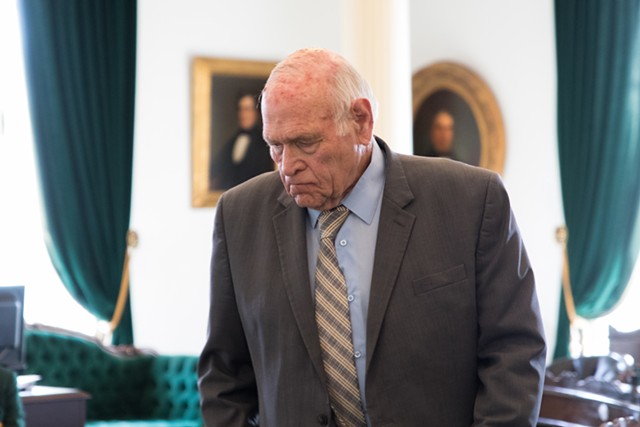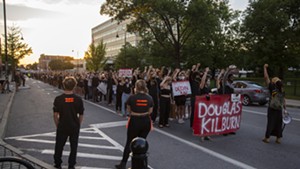
- File: Colin Flanders ©️ Seven Days
- Sen. Dick Sears
The Vermont Senate will debate a bill next year to eliminate a widely used legal defense that shields police from civil lawsuits over their misconduct.
Senate Judiciary Committee chair Dick Sears (D-Bennington) announced the push to end so-called “qualified immunity” for law enforcement officers during a press conference Wednesday. He was joined by a coalition of supporters from the ACLU of Vermont; local NAACP chapters; the Cato Institute, a libertarian think tank; Ben & Jerry’s cofounders Ben Cohen and Jerry Greenfield; and the Law Enforcement Action Partnership.
The bill, modeled after one Colorado passed in 2020, would allow victims of police misconduct to sue in state court and eliminate a key barrier that often prevents the victims from recovering damages.
“I believe firmly that good law enforcement depends on community trust,” Sears said. “And this reform is an important step towards building that trust in our community.”
Qualified immunity is a judicial doctrine established decades ago by the U.S. Supreme Court that has trickled down to the states. It holds that even when a public official violates someone’s civil rights, they cannot be held liable unless the courts have previously established that the official’s specific conduct was unconstitutional.
The standard has led to widely criticized results. A federal judge, for instance,
blocked civil claims against officers in California who were accused of stealing hundreds of thousands of dollars while executing a search warrant.
Activists nationwide, including the Ben & Jerry's cofounders, have pushed to remove the doctrine in the aftermath of George Floyd's murder last year in Minneapolis. But Democrat-led efforts to pass national legislation in Congress have stalled, shifting the debate to statehouses.
Sears said Wednesday that he was cosponsoring the bill with Senate President Pro Tempore and U.S. House candidate Becca Balint (D-Windham), Sen. Kesha Ram Hinsdale (D-Chittenden) and Sen. Phil Baruth (D/P-Chittenden). The bill would build upon other recently enacted police reforms, including a ban on chokeholds and a body-camera mandate for Vermont State Police.
“This will have little or no impact on most police officers,” Sears said. “But to an injured person, it can mean everything.”
Most government officials currently enjoy qualified immunity, which proponents see as an important protection for public employees. Senate Democrats are proposing only to eliminate the protection for police officers, Sears said.
Similar campaigns, while popular in polls, have faced vigorous opposition from law enforcement groups. Legislation has failed in numerous states in recent months, and most of the bills that have passed were significantly narrowed, according to a
Washington Post analysis.
The organization representing local municipal governments, the Vermont League of Cities & Towns, defended qualified immunity last year, arguing that eliminating the protection would make it difficult to recruit police officers and do little to improve public safety.
“Vermont cities and towns are well positioned to hold officers accountable for excessive force incidents and poor performance through independent investigations of complaints and the regular disclosure of the results,”
a policy memo on the group’s website reads.
Advocates disagree. “By ending qualified immunity in Vermont, we send the message that accountability exists, that there will be, from here on out, consequences for actions,” said Mia Schultz, president of the Rutland-area chapter of the NAACP.
She and others at Wednesday's announcement emphasized that victims of police misconduct tend to be from marginalized groups. Research in Vermont has found racial disparities in traffic stops, uses of force and incarceration.
The Colorado law is the most expansive reform so far, the
Post reported. That’s the model advocates are pushing in Vermont, though Sears said he plans to “hear all sides.”
Even if qualified immunity were stricken, there would be a limit on how much cops themselves would have to pay. The draft Vermont bill,
like the Colorado law, states that officers may be forced to pay 5 percent of a judgment in state court, up to $25,000; the rest is covered by their employers. Even then, local governments can decide to cover the entire cost themselves if they determine the officer was acting in “good faith.”
Diane Goldstein of the Law Enforcement Action Partnership, a nonprofit policy group, said municipalities already cover the vast majority of civil damages in cases of officer misconduct. She suggested that opposition to the proposed reform from local governments and private insurance companies is about “protecting municipalities’ bottom lines.”
By creating an easier path to sue police officers through state court, the proposed bill would provide a new option for people such as Jeremie Meli. He was injured in 2018
when Burlington police sergeant Jason Bellavance pushed him into a wall. Meli and his brothers are suing Bellavance and the City of Burlington in federal court, alleging civil rights violations and excessive force.
Bellavance was disciplined for his actions and later left the department under a separation agreement. But city attorneys are seeking to have the civil claims dismissed, in part, on grounds that Bellavance is entitled to qualified immunity.
“As of September 9, 2018, there was no establish[ed] rule making clear, beyond debate, that it was unconstitutional for Defendant Bellavance to push Plaintiff in the chest,” the city’s attorneys wrote.
A hearing on the city’s motion was held last month. A decision is pending.


















Comments
Comments are closed.
From 2014-2020, Seven Days allowed readers to comment on all stories posted on our website. While we've appreciated the suggestions and insights, right now Seven Days is prioritizing our core mission — producing high-quality, responsible local journalism — over moderating online debates between readers.
To criticize, correct or praise our reporting, please send us a letter to the editor or send us a tip. We’ll check it out and report the results.
Online comments may return when we have better tech tools for managing them. Thanks for reading.